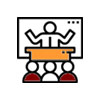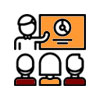THE PHASES

Phase 1
Working Conference
CGEIN and the Nepal Buddhist Federation convened a working conference in November, 2017 that included the educational leadership of 40 gönpas (both central and community) representing all of Nepal’s provinces. Participants were tasked with discussing and developing the broad guidelines of an education program for Nepal’s community gönpas. Khyentse Foundation provided supporting funds.

Phase 2
National Research Study
CGEIN is finalizing funding support for the second phase of the initiative, which is a national educational research study of rural gönpas and their communities. UNICEF/Nepal, Nepal Buddhist Federation, and Kathmandu University School of Education will be implementing partners with CGEIN in conducting the study. The study will use complementary survey and action research methods to achieve the following goals.
- Systematically describe and understand the educational and associated sociocultural and economic realities of Nepal’s rural gönpas, and the communities they serve.
- Understand gönpa and community leaders’ thinking on improving the education of novices and other community youth, and to incorporate that thinking into future educational planning and design.
- Assess the ability of rural gönpas and their communities, including the local governance structure, to accept and sustain a GON-certified education program that integrates scholastic education with dharma education.
- Make a case to gönpa and community leaders for future collaboration with CGEIN in the pilot education program aimed at increasing equitable educational access for gönpa novices and other community youth.
- Produce a report of use to governmental and non-governmental agencies for purposes of educational planning in support of access to equitable education in Nepal’s Northern communities.

Phase 3
Education Program Design and Piloting
This phase will be devoted to designing and piloting the education program, including supplementary materials development and the training of teaching fellows. We expect the education program to have the following general characteristics given the guidelines discussed at the working conference. These will be modified and refined based on the findings from the Phase 2 study.
- The curriculum content will integrate academic subjects with basic dharma knowledge, ethics, and practice.
- Teaching fellows from central gönpas will be trained by CGEIN and will staff the education program in the community gönpas using a field support model similar to that currently used by Teach for Nepal.
- The education program will follow GON guidelines and will be a government certified community school at the basic education level (grades 1-8).
- The classroom and curriculum will be multi-grade and multi-level, and will function with a team of two teaching fellows who will receive ongoing in-service field support.
- The program will promote active teaching/learning.
- The program will provide instruction in three languages: Nepali, English, Tibetan/Bhotiya Bhasa, possibly using the local language as a bridge language.
- The education program will be for both gönpa novices and non-monastic community youth.

Phase 4
Ongoing Development and Expansion
CGEIN and its partners will continue the development of the education program grade by grade through grade eight while supporting the program in the gönpa communities involved in the pilot program. CGEIN will also make the lower grade aspects of the program available to other interested gönpa communities during this phase.

Phase 5
Institutionalization
CGEIN will transition to being a support organization as more rural gönpa communities participate, but will continue a smaller on-going educational development and innovation mission. Prominent central gönpas will take on principal roles in the support and in the operation of CGEIN.


